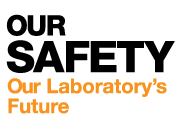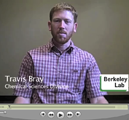



"Construction work requires a hot work or fire safety permit,” says Amie Krigbaum, the Lab’s Fire Inspector, "because construction workers often use welding or brazing equipment and chop saws that can produce sparks or enough heat to cause a fire." So it’s not a surprise that her busiest months in 2009 were August and September, when several infrastructure improvement projects went into high gear, a result of the Lab receiving more than $100 million in federal government stimulus funds. Despite Krigbaum’s unusually busy year-end schedule, she managed to prevent fires and to save a life. More>
 In The News: Profile of IT Power-Use Researcher Jonathan Koomey
In The News: Profile of IT Power-Use Researcher Jonathan Koomey [Mercury News] When Jonathan Koomey began thinking about power consumption in the information technology industry, he didn't expect to come up with the energy equivalent of Moore's Law, the observation of Intel co-founder Gordon Moore in 1965 that the number of transistors that could be cost-effectively put on an integrated circuit would double every two years. But he may have done just that. Koomey, a researcher affiliated with Stanford University and Berkeley Lab and currently a visiting professor at Yale University, is co-author of three recent studies into the growing power requirements of the information technology industry — a source of growing concern as evidence mounts that energy use is contributing to the greenhouse effect. More>
 Meet a Postdoc: Travis Bray
Meet a Postdoc: Travis Bray Postdoctoral scholars are the lifeblood of any research institution. Too often, though, they work in relative anonymity before heading off to their own scientific careers across the country and around the world. The "Meet a Postdoc" video series turns some much-needed light on this important segment of Berkeley Lab's population and offers a chance to learn more about them as individuals while they are in our midst. Today’s subject is Travis Bray, with the Chemical Sciences Division.
 [San Francisco Chronicle] The Richard C. Blum Center for Developing Economies, an ambitious academic enterprise, supports research and the practice of ideas and methods with "real-world impact" in improving the lives of the 3 billion people on Earth who subsist on less than $2 a day. Its "innovation initiatives" program supports faculty and student researchers in 30 departments, from the Haas School of Business to Berkeley Lab. Multidisciplinary teams work on issues like safe water, sanitation, and energy systems, often linking them up with global companies and nongovernmental organizations around the world. More>
[San Francisco Chronicle] The Richard C. Blum Center for Developing Economies, an ambitious academic enterprise, supports research and the practice of ideas and methods with "real-world impact" in improving the lives of the 3 billion people on Earth who subsist on less than $2 a day. Its "innovation initiatives" program supports faculty and student researchers in 30 departments, from the Haas School of Business to Berkeley Lab. Multidisciplinary teams work on issues like safe water, sanitation, and energy systems, often linking them up with global companies and nongovernmental organizations around the world. More>
 IT: Deadline Approaching for Mobile Application Competition
IT: Deadline Approaching for Mobile Application Competition The Nov. 1 deadline for submitting ideas to the IT Mobility Competition is just around the corner. Those writing code have until Dec. 1. Over 70 entries have been received so far, but the contest is still wide open. Winners will receive cash awards of up to $2,500 for code and $500 for ideas. More>
 JGI: Fall Edition of ‘The Primer’ is Available
JGI: Fall Edition of ‘The Primer’ is AvailableThe fall edition of the Joint Genome Institute newsletter, The Primer, has arrived. Included are articles on new gap resolution software for academic use, the JGI Fungal Program, the Genomic Standards Consortium, marine microbial lifestyles and the annual Genomics of Energy and Environment meeting next March. More>
Today at Berkeley Lab is produced by Public Affairs' Communications Group